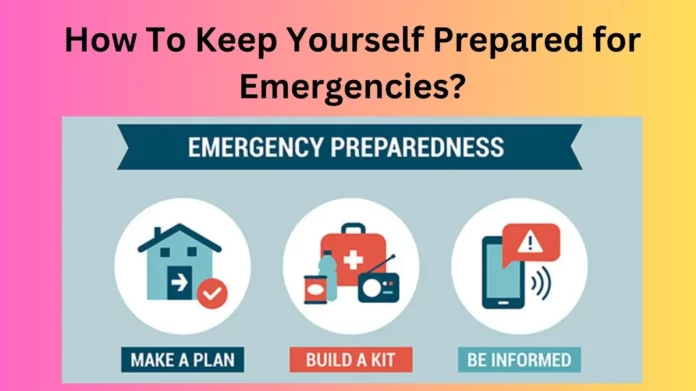1. Intruduction:
In a world where uncertainties abound, being prepared for emergencies is not just a smart move; it’s a necessity. Whether it’s a natural disaster, a sudden power outage, or any unexpected situation, having a well-thought-out plan can make all the difference. Let’s explore some practical steps to ensure you’re always ready to face the unexpected.
2: Understanding the Importance of Preparedness
Emergencies can strike at any time, catching us off guard. Being prepared is not about living in fear but rather about empowering yourself to handle any situation that may arise. It’s like having a safety net that gives you peace of mind, knowing you can navigate through challenges with confidence.
3: Creating a Personal Emergency Plan
One of the first steps toward preparedness is crafting a personalized emergency plan. Identify potential risks in your area, such as earthquakes, floods, or power outages. Consider the needs of every family member, including pets, and establish communication and evacuation strategies.
4: Assembling an Emergency Kit
Having a well-stocked emergency kit is crucial. Think of it as your survival toolbox. Include essentials like non-perishable food, water, first aid supplies, flashlights, batteries, and important documents. Regularly check and update your kit to ensure everything is in working order.
5: Stay Informed: The Power of Communication
In times of crisis, information is key. Stay informed about potential threats and developments by subscribing to local alerts and news updates. Create a communication plan with family and friends, and designate a meeting point in case you are separated during an emergency.
6: Practice Makes Perfect: Conducting Drills
Preparedness isn’t just theoretical; it requires practice. Conduct emergency drills with your family, so everyone knows their roles and responsibilities. Practice evacuating your home and meeting at the designated location. Regular drills ensure that when a real emergency occurs, everyone can act swiftly and efficiently.
7: Securing Your Home
Make your home a safe haven by securing it against potential hazards. Install smoke detectors, fire extinguishers, and carbon monoxide detectors. Reinforce doors and windows, and know how to shut off utilities in case of a gas leak. Taking these precautions can significantly reduce risks.
8: Financial Preparedness: Building an Emergency Fund
Emergencies often come with unexpected expenses. Building an emergency fund can provide a financial cushion during challenging times. Aim to save three to six months’ worth of living expenses in a separate account, ensuring you have the financial flexibility to handle unexpected setbacks.
9: Building a Support Network
Don’t face emergencies alone. Build a support network within your community. Connect with neighbors, local emergency services, and community groups. Having a support system in place can make a world of difference during challenging times.
10: Mental Preparedness: Staying Calm Under Pressure
Being mentally prepared is just as important as physical preparedness. Practice mindfulness and stress reduction techniques to help you stay calm under pressure. A clear mind can think more rationally and make better decisions during emergencies.
11: Adapting to Changing Circumstances
Flexibility is a key component of preparedness. Recognize that plans may need to change based on the nature of the emergency. Be open to adapting and evolving your strategies as circumstances unfold.
12: Staying Healthy: Physical Fitness Matters
Maintaining good physical health is integral to preparedness. Regular exercise and a healthy lifestyle contribute to your overall resilience. A strong body is better equipped to handle the physical demands of emergencies.
13: Sustainability and Eco-Friendly Preparedness
Consider incorporating sustainable practices into your emergency preparedness. Invest in solar-powered chargers, reusable water bottles, and eco-friendly supplies. Being environmentally conscious in your preparations ensures a long-term, sustainable approach.
14: Children and Elderly: Special Considerations
When preparing for emergencies, consider the unique needs of children and elderly family members. Customize your emergency plan to accommodate their specific requirements, ensuring their safety and well-being.
15: Review and Update Your Plan Regularly
Preparedness is an ongoing process. Regularly review and update your emergency plan to account for changes in your family dynamics, living situation, or community. Staying proactive ensures that you’re always one step ahead when it comes to facing unexpected challenges.
Conclusion: Taking Control of Your Destiny
In a world filled with uncertainties, being prepared for emergencies is a proactive way to take control of your destiny. By creating a comprehensive plan, assembling an emergency kit, and staying informed, you empower yourself to face any challenge head-on. Remember, preparedness is a journey, not a destination.
FAQs: Addressing Common Concerns
Q1: How often should I update my emergency kit?
A1: It’s recommended to check and update your emergency kit every six months. Ensure that all supplies are in good condition, and replace any expired items.
Q2: What should I include in a family communication plan?
A2: A family communication plan should include contact information for each family member, an out-of-town emergency contact, and a meeting point. Practice the plan regularly.
Q3: Is it necessary to have an emergency fund if I have insurance?
A3: Yes, having an emergency fund is crucial even if you have insurance. It provides immediate access to funds for necessities and ensures financial stability during the initial stages of an emergency.
Q4: How do I involve children in emergency preparedness drills without causing fear?
A4: Frame drills as a family activity, focusing on the importance of being safe and helping each other. Use age-appropriate language and reassure them that these practices are to keep everyone secure.
Q5: Can I rely solely on technology for emergency alerts?
A5: While technology is valuable, it’s essential to have multiple sources of information. Include a battery-powered weather radio and subscribe to local alerts to ensure you receive timely information, even during power outages.
By following these guidelines and continually refining your approach, you’ll be well-equipped to face the unexpected with confidence. Preparedness is not a task; it’s a mindset that empowers you to navigate life’s uncertainties successfully. Stay ready, stay safe!















